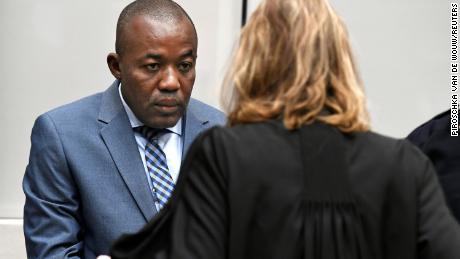Alfred Yekatom is the former commander of a group of 3,000 members of the anti-balaka movement, a group consisting mainly of Christians that opposed a largely Muslim rebel alliance known as Seleka, the ICC said.His crimes allegedly took place "in various locations within the Central African Republic, including the capital Bangui and Lobaye prefecture," the court said.The anti-balaka coalition, which translates to "anti-machete," was formed after Seleka ousted President François Bozizé and replaced him with the country's first Muslim President.The coalition has repeatedly clashed with Seleka groups and led frequent massacres against Muslim populations in the country over the course of its ruinous civil war, according to Amnesty International. Appearing in court to be informed of the charges leveled against him, Yekatom — who is also a member of Parliament — claimed that upon his arrest he was held in presidential detention for a month and was tortured and beaten with the butts of Kalashnikov rifles. He was originally arrested by local authorities in late October, and was handed over to a tribunal in The Hague on November 17. The court accused Yekatom of crimes against humanity, including murder, imprisonment, torture and enforced disappearance.Mutilation, intentional attacks against the civilian population and the use of soldiers under the age of 15 are among the war crimes of which he is accused.A Human Rights Watch report last year said that armed anti-balaka groups in the CAR "have used rape and sexual slavery as a tactic of war across the country during nearly five years of conflict."Yekatom will next appear in court in April, when evidence will be examined and discussed.
The court accused Yekatom of crimes against humanity, including murder, imprisonment, torture and enforced disappearance.Mutilation, intentional attacks against the civilian population and the use of soldiers under the age of 15 are among the war crimes of which he is accused.A Human Rights Watch report last year said that armed anti-balaka groups in the CAR "have used rape and sexual slavery as a tactic of war across the country during nearly five years of conflict."Yekatom will next appear in court in April, when evidence will be examined and discussed.
CNN's Sebastian Shukla contributed to this report.
Original Article
Alfred Yekatom is the former commander of a group of 3,000 members of the anti-balaka movement, a group consisting mainly of Christians that opposed a largely Muslim rebel alliance known as Seleka, the ICC said.His crimes allegedly took place "in various locations within the Central African Republic, including the capital Bangui and Lobaye prefecture," the court said.The anti-balaka coalition, which translates to "anti-machete," was formed after Seleka ousted President François Bozizé and replaced him with the country's first Muslim President.The coalition has repeatedly clashed with Seleka groups and led frequent massacres against Muslim populations in the country over the course of its ruinous civil war, according to Amnesty International. Appearing in court to be informed of the charges leveled against him, Yekatom — who is also a member of Parliament — claimed that upon his arrest he was held in presidential detention for a month and was tortured and beaten with the butts of Kalashnikov rifles. He was originally arrested by local authorities in late October, and was handed over to a tribunal in The Hague on November 17. The court accused Yekatom of crimes against humanity, including murder, imprisonment, torture and enforced disappearance.Mutilation, intentional attacks against the civilian population and the use of soldiers under the age of 15 are among the war crimes of which he is accused.A Human Rights Watch report last year said that armed anti-balaka groups in the CAR "have used rape and sexual slavery as a tactic of war across the country during nearly five years of conflict."Yekatom will next appear in court in April, when evidence will be examined and discussed.
The court accused Yekatom of crimes against humanity, including murder, imprisonment, torture and enforced disappearance.Mutilation, intentional attacks against the civilian population and the use of soldiers under the age of 15 are among the war crimes of which he is accused.A Human Rights Watch report last year said that armed anti-balaka groups in the CAR "have used rape and sexual slavery as a tactic of war across the country during nearly five years of conflict."Yekatom will next appear in court in April, when evidence will be examined and discussed.
CNN's Sebastian Shukla contributed to this report.
Original Article











